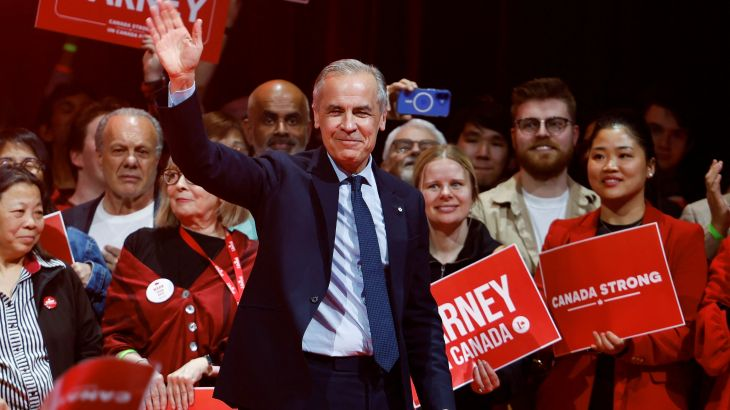Canada’s Unexpected Election Upset: A Triumph of National Unity

In a stunning reversal of political fortunes, Canada’s Liberal Party, under the leadership of Mark Carney, has secured a remarkable victory in the 2025 federal election. This unexpected outcome not only defied pre-election predictions but also underscored a profound shift in the nation’s political landscape. What was once considered a potential Conservative stronghold turned into a Liberal triumph, signaling that Canadians are ready to embrace a future that puts unity and economic stability at the forefront. The election results are a testament to the shifting dynamics of the political narrative in the country and a call for renewed focus on national interests.
The 2025 election was widely expected to be a win for the Conservative Party, as polling data and the public mood seemed to lean in their favor. Many analysts had projected that the leadership of Pierre Poilievre, with his strong stance on economic freedom and national security, would resonate with voters who were increasingly frustrated with the status quo. The Liberal Party, led by Justin Trudeau up until then, had seen its popularity wane due to various domestic issues such as inflation and concerns over government spending. Yet, in a political twist, Mark Carney, the former central bank governor and widely respected financial expert, entered the scene and changed the course of the election.
Carney’s candidacy was not just about offering an alternative to Poilievre’s Conservative leadership; it was about reimagining Canada’s role on the global stage in a rapidly changing world. His message of unity and resilience, particularly in the face of external pressures, struck a chord across the political spectrum. The Canadian electorate, traditionally wary of dramatic political shifts, found themselves gravitating towards Carney’s pragmatic yet visionary approach. His experience as a central banker, renowned for his role in navigating the global financial crisis, added credibility to his stance on economic stability and national sovereignty.
Central to the campaign’s momentum was the growing discontent with U.S. President Donald Trump’s aggressive policies. Trump’s rhetoric had been a source of concern for many Canadians, especially as he continued to impose tariffs and threatened to annex parts of Canadian territory, sparking national outrage. Carney capitalized on this tension, positioning himself as the bulwark against these external challenges. He emphasized the need for a united front to safeguard Canada’s interests, making the election not just about domestic policies but about standing firm in the face of international pressures.
The Liberal Party’s success, while not an outright majority, marked a significant political shift in Canada. With 169 seats in the 343-member House of Commons, Carney’s party has the mandate to lead a minority government. This result is not just a political victory for Carney but a resounding affirmation of the Canadian electorate’s desire for stability, unity, and strength. It signals that Canadians are looking for leadership that can navigate the complexities of a polarized world, one that values independence, resilience, and the ability to stand up to international pressures without compromising core values.
Yet, while the victory is significant, it is clear that the road ahead will not be easy for the Liberal Party. Forming a stable government will require collaboration with smaller parties, notably the New Democratic Party (NDP) and the Bloc Québécois. While the Liberals’ victory provides them with the political capital to lead, the delicate task of negotiating with opposition parties will be key to maintaining public confidence and achieving the government’s goals. The necessity of building coalitions within a fragmented political landscape will test Carney’s political acumen and ability to bring diverse interests together for the greater good.
Beyond the immediate challenges of governance, this election also marks a pivotal moment in Canada’s political evolution. It highlights the electorate’s capacity to rally behind leadership that embodies resilience and a commitment to national values. As Canada faces challenges such as climate change, technological advancements, and increasing geopolitical tensions, the country’s leadership must be able to balance domestic concerns with international diplomacy. Carney’s leadership, rooted in his experience with global economic systems, offers a vision that blends both.
The triumph of the Liberal Party is not just a victory of one political ideology over another but a resounding call for the preservation of national identity and sovereignty. The electorate rejected the notion of isolating Canada from the global community, instead embracing a vision of active engagement on the world stage, one that protects Canadian values while asserting its right to determine its own path. In this context, Carney’s rise to power represents not just a political shift but a reinvigoration of Canadian nationalism, grounded in a commitment to democratic values and global peace.
Canada’s path forward will require careful stewardship, and it will not be without its difficulties. Carney’s government will have to address pressing issues such as affordable housing, climate change, healthcare, and economic recovery. However, the most significant challenge may be the need to bridge the growing divisions within the country, particularly between urban and rural communities. The success of Carney’s leadership will hinge on his ability to unite Canadians across these divides, drawing on the strength of the country’s diversity while fostering a shared sense of purpose.
In conclusion, Canada’s unexpected election result serves as a testament to the power of unity and principled leadership. It reaffirms the nation’s dedication to its sovereignty and sets the stage for a future where Canada stands firm in the face of external challenges. As Mark Carney takes the helm, Canada stands at a crossroads, poised to navigate the complexities of a rapidly changing world while safeguarding its democratic values. The lessons of this election are clear: in times of uncertainty, it is unity and resilience that will determine the future. The question now is whether Canada’s new leadership can rise to meet the challenges ahead and fulfill the promise of a stronger, more united nation.











